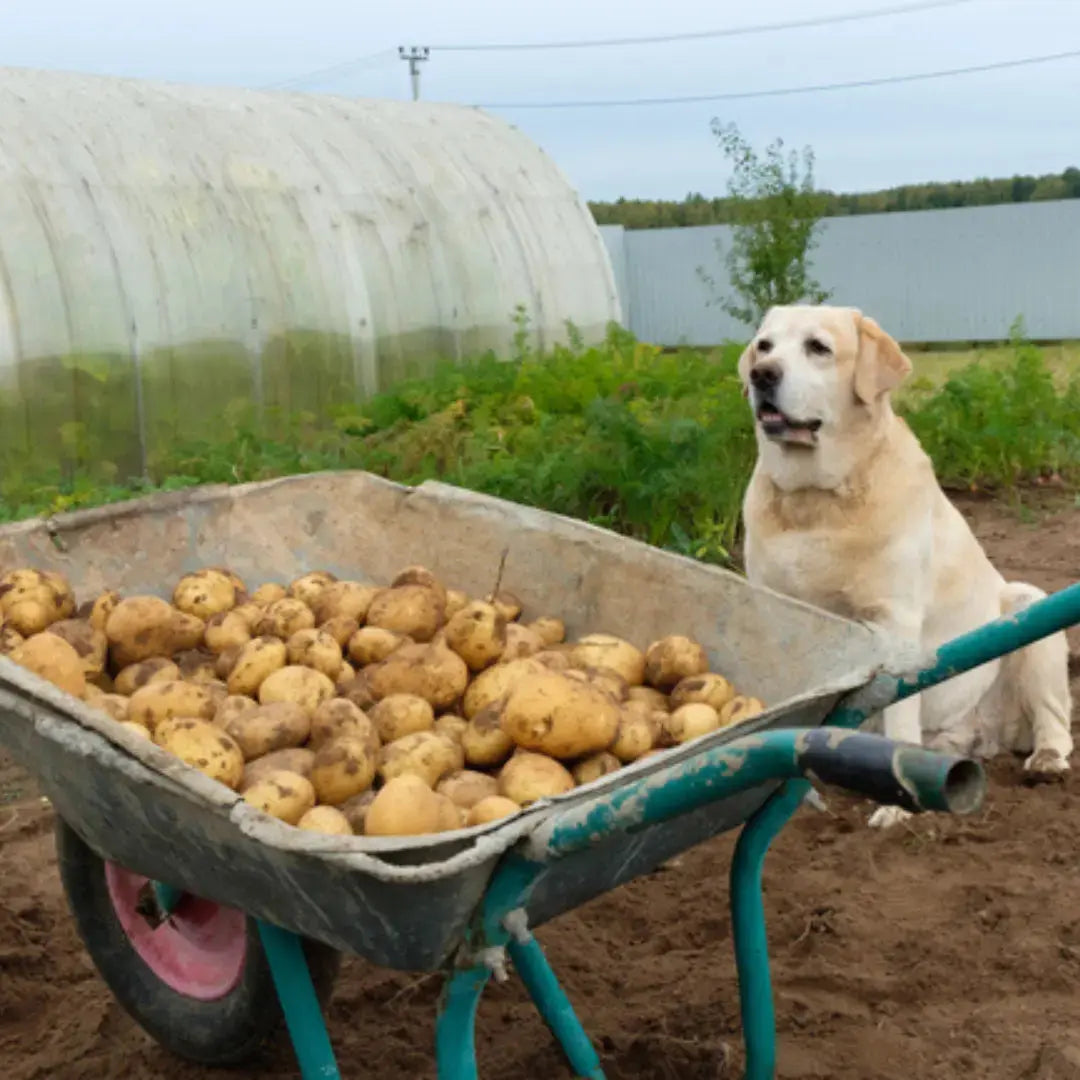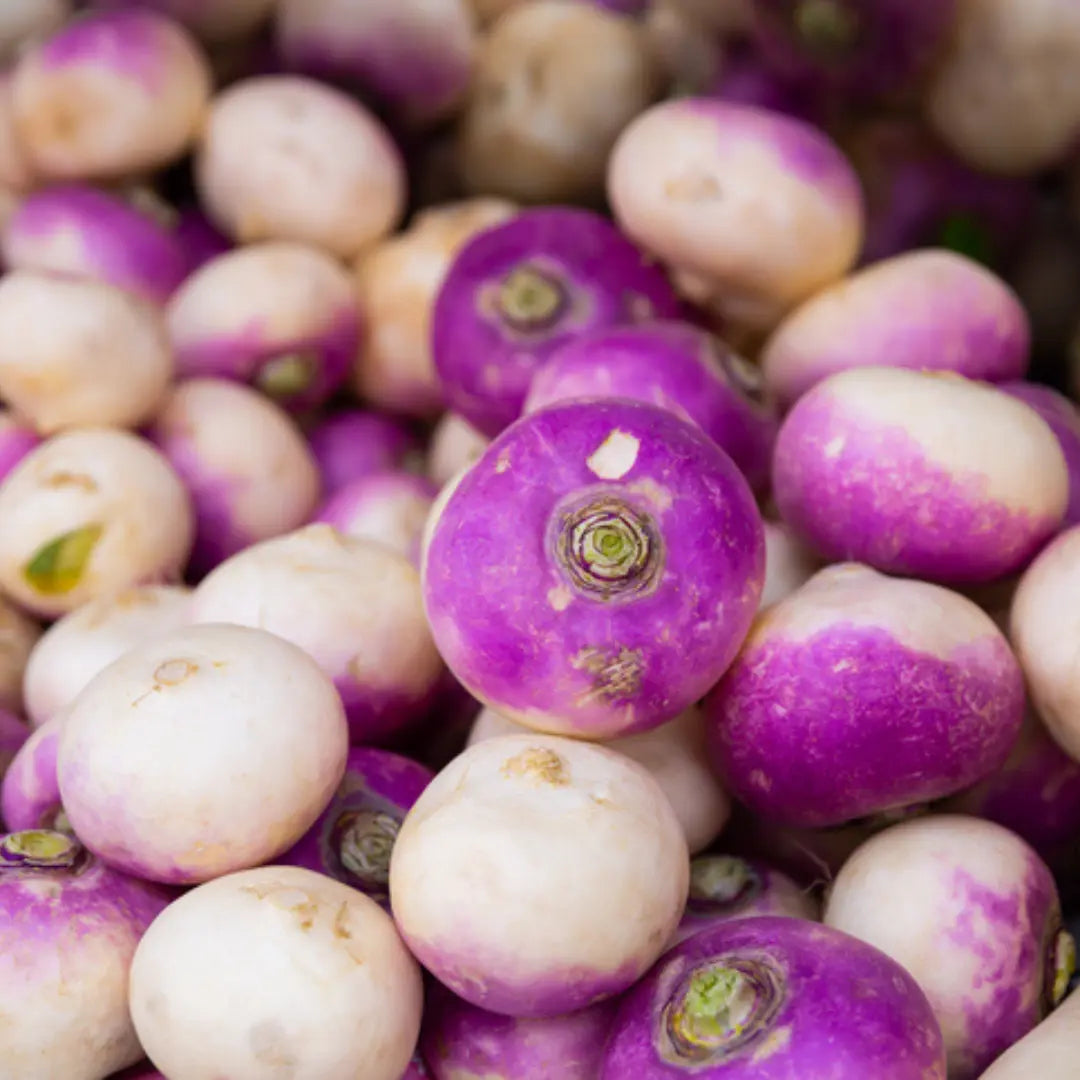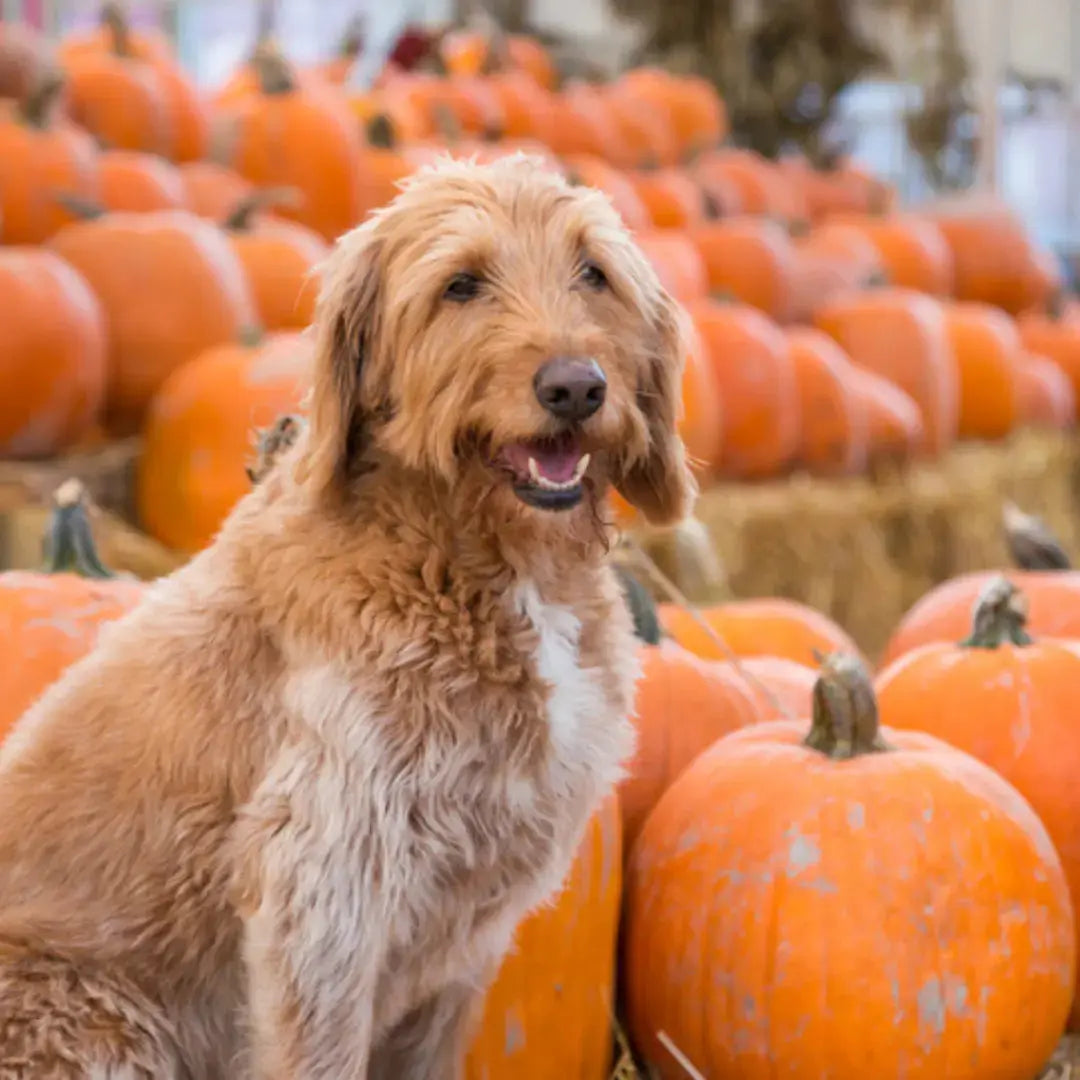As dog parents, we all want to ensure our pups have a balanced and healthy diet to keep them in optimal health. You’re probably looking at feeding your dog fresh whole human foods to benefit their long-term health & longevity. As with any human food you want to share with your dogs, it's critical to know what foods are suitable for their consumption. One such food that many dog owners have questioned over the years is potatoes. Can dogs eat potatoes? In this blog, we'll take a comprehensive look at whether dogs can eat potatoes, how to prepare them, and what benefits or risks they pose to your pup and how to best cook them for your dog.
Can Dogs Eat Potatoes? Are Potatoes Good for Dogs?
The short answer to the question, "Can dogs eat potatoes?" is yes, they can safely consume cooked potatoes in small quantities. Potatoes are an excellent source of dietary fiber, potassium, and vitamins C and B6, which can all benefit your dog's overall health. However, you have to be cautious as unripe or raw potatoes and potato plant leaves and stems contain solanine, a chemical that can be toxic to dogs.
So, how should you prepare potatoes for your dog? Firstly it's essential to ensure that the potatoes washed, and cooked thoroughly without any added seasoning or oils. This ensures your dog is getting the full nutritional benefits while also avoiding any unnecessary fats or spices that may irritate their digestive system.
Nutritional Value and Benefits of Potatoes for Dogs
Potatoes offer various nutritional benefits for your dog's pet health:
Carbs: Potatoes provide a source of carbohydrates, which can be beneficial for your dog's body, providing energy and supporting overall vitality.
Fiber: Potatoes contain dietary fiber, which can aid in digestion and regulate bowel movements, reducing the risk of intestinal blockage.
Vitamins: Potatoes are rich in vitamins, including Vitamin C, an antioxidant which supports your dog's immune system, and Vitamin B6, important for various bodily functions.
Minerals: Potatoes contain essential minerals like potassium, calcium and magnesium, promoting strong bones and a healthy dog's body.
While these nutritional benefits are significant, it’s crucial to understand that potatoes contain a higher glycemic index than other vegetables. This means that they can cause a rapid spike in blood sugar levels, which can be a significant concern for overweight and diabetic dogs.
Remember that while potatoes can offer pet health benefits, they should not be given as an occasional treat or added into balanced home cooking recipes and never replace your dog's regular dog food.

Stay Up To Date
Sign up for our recipe club to access new launches, weekly recipes, DIY treats, tips & tricks that will keep your dog’s tail wagging!
Can Dogs Eat Potato Skins?
While potato skins are not toxic to dogs, they can be challenging to digest and may lead to an upset stomach or even intestinal blockage in some cases. As responsible pet owners, it's best to remove the skins or feed them sparingly to prevent any or gastrointestinal discomfort.
Can Dogs Eat Sweet Potatoes? Dog Sweet Potatoes
Yes, dogs can eat sweet potatoes. Sweet potatoes are considered one of the healthier potato options for dogs in the root vegetable family. They are rich in dietary fiber, vitamins A and vitamin C, and antioxidants. Their low oxalate content reduces the risk of urinary issues and calcium oxalate stone formation in some dogs. The natural sweetness of sweet potatoes also makes them a tasty and nutritious treat for your canine friend.
To find more info on all things sweet potatoes on our blog click here
Dog Child Mixed Veggie Meal Mix For Dogs
If you’re looking for a quick and nutritious way to add veggies - specifically sweet potato to your dog’s diet then Dog Child’s Mixed Veggie Meal Mix is perfect. Filled with nutritious vegetables such as sweet potato, broccoli, pumpkin, kale, and parsley, you simply rehydrate with water and mix in with your dog’s ground protein of choice - voila you have a homemade meal for your dog. You can either use a complete and balanced meal or mix it into your dog’s regular food as a topper. Get your paws on one of our Meal Mixes today.
 Mixed Veggie Meal Mix for Dogs
Mixed Veggie Meal Mix for Dogs
Homemade Dog Food Recipes with Potatoes and Sweet Potatoes
Check out some of our at-home recipes for dogs using potatoes!
Beef & Sweet Potato Stew for Dogs
Smashes Sweet Potatoes & Homemade Chicken for Dogs pictured below!

Can Dogs Eat Sweet Potato Skins?
The skin on sweet potatoes is generally safe for dogs to eat, as it doesn't contain the same level of solanine found in regular potatoes. However, always ensure that the sweet potato skin is cooked and not seasoned before serving it to your dog.
Can Dogs Have Mashed Potatoes?
Plain mashed potatoes without additives like butter, cheese, or seasoning are generally safe for dogs in small amounts. However, keep in mind that mashed potatoes are calorie-dense and may contribute to weight gain if given excessively. Excessive fats or seasonings can be bad for dogs, so it's essential to keep them plain and serve them in moderation.
Can Dogs Have Raw Potato?
Raw potatoes are not recommended for dogs due to the risk of solanine toxicity, a compound found in potatoes that can be harmful when consumed in large amounts. Cooking potatoes breaks down solanine, making them a safer option for your pet.
Can Dogs Have Raw Sweet Potato?
Just like raw potatoes, feeding your dog raw sweet potatoes is generally not recommended. While sweet potatoes are considered safe and nutritious for dogs when cooked, their raw form can be challenging for dogs to digest, potentially leading to digestive upset, including an upset stomach and diarrhea. Additionally, raw sweet potatoes contain a compound called trypsin inhibitor, which can interfere with a dog's ability to digest proteins effectively. Cooking sweet potatoes thoroughly by baking, boiling, or steaming them until they are soft and easily mashable is the best way to ensure their safety and digestibility for your pup. This approach allows you to provide a nutritious and easily digestible snack that your dog can enjoy without any concerns about digestive issues or nutrient interference.

Looking for a welcoming community to learn how to cook for your dog? Join our Healthy Homemade Dog Food Recipes group on Facebook today!
Healthy Homemade Dog Food Recipes Facebook Group
Can I Share My French Fries with My Dog?
It's best to avoid sharing commercial french fries with your dog. Most french fries sold at restaurants and fast-food chains are high in salt, unhealthy fats, and seasonings that can be bad for dogs. Homemade, plain, and baked potato fries in moderation are a safer alternative.
Can Dogs Eat Potato Chips?
No, dogs should not eat potato chips. Potato chips are typically high in unhealthy fats, sodium, and often contain added seasonings or flavourings that can be harmful to dogs. The high salt content in potato chips can lead to sodium ion poisoning in dogs, which can result in symptoms like excessive thirst, urination, vomiting, diarrhea, and even more severe health issues. It's best to avoid sharing potato chips with your dog.
Can Dogs Have Sweet Potato Fries?
Sweet potato fries can be given to dogs in moderation, but with caution. While sweet potatoes are generally safe for dogs, sweet potato fries from restaurants or packaged varieties may be deep-fried or seasoned with ingredients that are not suitable for dogs. If you want to offer sweet potato fries to your dog, it's better to make them at home by baking sliced sweet potatoes with minimal seasoning or salt.
Can Dogs Eat Baked Potatoes?
Plain, baked potatoes are generally safe for dogs in moderation. However, you should avoid adding any toppings like butter, sour cream, cheese, or seasonings, as these can be unhealthy for dogs. Baking is a healthier cooking method compared to frying, as it eliminates the added fats and oils that can be problematic for dogs.
FAQ
Can Dogs Eat Jacket Potatoes?
Jacket potatoes, also known as baked potatoes with the skin intact, can be given to dogs in moderation. Ensure that the jacket potato is plain and free from any toppings or seasonings. The skin of a baked potato contains some fiber and nutrients but should be fed sparingly, as it can be difficult to digest for some dogs.
Can Dogs Eat Russet Potatoes?
Yes, dogs can eat russet potatoes, but they should be cooked and served plain. Russet potatoes, like other potato varieties, should be prepared without any seasonings, butter, or toppings. Remember that russet potatoes, when cooked, lose most of their solanine content, making them safe for dogs to consume in moderation.

Can Dogs Eat Hash browns?
In short, it's best to avoid feeding your dog hash browns. Hash browns are typically cooked with fats, often fried, which can be tough on a dog's digestion and may even lead to pancreatitis. Additionally, they often contain high levels of salt and seasonings, which can be detrimental to a dog's health and lead to sodium ion poisoning. Some recipes may also include toxic ingredients like onions or garlic.
Hash browns are calorie-dense, and excessive consumption can contribute to obesity in dogs. Their crispy texture can be hard on a dog's stomach, potentially causing gastrointestinal discomfort.
If you want to offer your dog potatoes as an occasional treat, it's better to serve plain, boiled, or baked potatoes in small portions without any added ingredients. Sweet potatoes are a safer and more nutritious alternative to regular white potatoes. However, always prioritize a balanced dog food diet, and consult your veterinarian if you have concerns about your dog's diet or if they have ingested something unsafe. Your dog's well-being should always be the top priority when it comes to their diet.
How Much Potato Can My Dog Eat?
The appropriate portion of potatoes for your dog depends on their size and individual dietary needs. As a general guideline, you can offer a small amount of cooked potato as an occasional treat or in addition to their regular dog food. Avoid making potatoes a significant part of their diet.
Is Potato or Rice Better for Dogs?
Both ingredients have their benefits and drawbacks. Dog’s should limit their carb intakes but adding both ingredients can offer healthy fiber. What’s important is feeding your dog a balanced diet and incorporating fresh whole foods where possible.
What Is the Best Potato for a Dog?
Sweet potatoes are often considered the best choice for dogs due to their higher nutritional content, including including Vitamin A, and lower solanine levels compared to regular white potatoes. However, regular potatoes can be fed in moderation as well. Plus dog’s love the taste.
Are There Any Dangers to Feeding Potato?
Yes, there are potential dangers associated with feeding potatoes to dogs:
Digestive Upset: Feeding large quantities of potatoes or allowing your dog to consume potato scraps may lead to digestive upset, including diarrhea and vomiting.
Solanine Poisoning: Potatoes contain solanine, especially in their green or sprouted parts. If your dog ingests a significant amount of solanine, it can lead to symptoms such as gastrointestinal distress, lethargy, and even more severe reactions. If you suspect solanine poisoning, contact your vet immediately.
Conclusion
In summary, potatoes can be a healthy addition to your dog's diet if prepared correctly in small quantities. It's essential to avoid letting your dog eat raw potatoes, and to peel, boil or bake them fully to provide your pup with all the nutritional benefits. As with any new dietary changes, it's best to seek advice from your veterinarian. And don't forget, while potatoes are a nutritious treat, commercial dog food provides the balanced nutrition your pup requires to stay healthy and happy.




